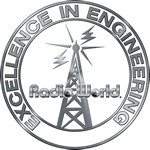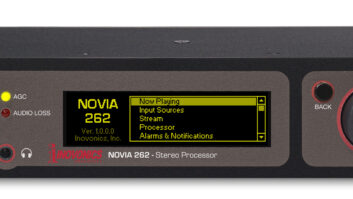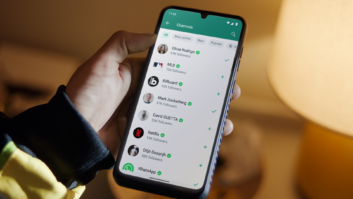When Cumulus Media’s engineering team recently rebuilt a pair of 2,000-foot tower sites in Houston after Hurricane Ike came through — replacing all of the transmission lines on both towers, and rebuilding an entire transmitter facility that had been flooded — it was just the latest entry on a lengthy list of technical accomplishments for the country’s second-largest radio broadcast company and for Gary Kline, its vice president of engineering and information technology.
Gary is our engineer of the year, recipient of Radio World’s Excellence in Engineering Award. We honor him for his achievements in broadcast engineering, his high level of responsibility at the company, his commitment to bettering the professional lives of employees, his mix of radio and IT savvy and his constant efforts to find creative ways to solve problems.
Tech tot
Born and raised in Queens in New York, Kline was interested in radio from the time he was a little kid. He remembers getting up late at night, turning on the stereo and listening to distant AM stations WOWO in Ft. Wayne, Ind., and CKLW in Detroit/Windsor, Ontario.
He’d pretend to be a DJ, using his eight-track deck and cassette player. Ham radio got him into electronics in a serious way; he took night classes at the New York Hall of Science at age 10 or 11 and built kits and circuits he bought at Radio Shack.
As a youngster he went on the NBC studio tour, and snagged a personal visit to WQXR(FM) from that station’s chief engineer. He remembers calling WYNY(FM) when he was in junior high to let them know about a technical problem he’d noticed on the air and wrangling that into a tour too.
By the time he graduated high school, Gary had attended summer engineering programs at Ball State University and the University of Colorado at Boulder through the National Science Foundation, and he had participated in a six-month internship at NBC Radio after lobbying the station to participate in the program. (Gary, as you can tell, was already good at networking.) That led to part-time paid engineering work there.
Business understanding
He did both technical and on-air work to help pay his way through Purdue University, where he studied business.
“I wanted to go to school for electrical engineering,” he said, but his father, a civil engineer, provided another perspective.
“My dad always told me, ‘You can be an engineer, but maybe you should be the guy who tells engineers what to do. You should have more of a business and management understanding.’” That helped give Gary the broad foundation he brings to his job, overseeing people who have stronger skill sets in more specific technical areas.
(To this day Gary is loyal member of Purdue’s family. He has done the broadcast engineering for the Purdue Football Radio Network since 1997, handling technical production for its games. Every autumn weekend he travels from his home in Atlanta to West Lafayette, Ind., where he keeps an apartment; for away games he continues on to the road stadium with the team.)
Over the years he has held engineering positions at ABC Radio and NBC Radio in New York as well as Artistic Media Partners in Indianapolis and other companies. He has done consulting work in at least eight countries.
He is a member of the Audio Engineering Society and Association of Federal Communications Engineers. He is or has been involved with the IPAWS Practitioner’s Working Group, Media Security Reliability Council, National Radio Systems Committee, SBE Radio Frequency Coordination and IT Strategy Committees, and NAB groups including its Digital Radio Committee, Broadcast Engineering Conference Committee and TAP Radio Discovery Group.
Big jobs
Gary Kline is 45. In addition to the award, this month marks 10 years for him at Cumulus Media, which now owns more than 350 radio stations.
Among notable accomplishments for him and his team was a huge IT project that became necessary when Cumulus Media Partners purchased Susquehanna Radio in 2006.
“We moved and consolidated their two data centers with our Atlanta facility, requiring many changes and expansions to our existing infrastructure. The project took at least six months of planning,” Gary told me.
“We built a new e-mail system using Microsoft Exchange … incorporating the additional 1,000 mailboxes which Susquehanna had. We moved and built the infrastructure for a multitude of Web sites, all of which used many third-party providers or customized software.” The entire Web site portfolio was cut over in a matter of seconds once it was time to pull the switch.
“We moved accounting information, listener databases, real estate/tower databases and several other critical systems.”
A year later, the technical team designed and built a large infrastructure for new Cumulus corporate offices in Atlanta. They worked with architects and designers to prepare wiring, technical areas, conference rooms, video and audio gear. When the building was ready for wiring the team installed the routers, phone and network gear for the new space.
“We spent almost a year working on the design and implementation of the move. We shut down the old office on Friday afternoon and had everyone up and running like nothing happened when they came to work on Monday morning. This included moving PCs and other technical gear for several people.”
Further projects over the decade include multiple RF jobs in Houston. There were new digital studios for Eugene, Ore., Topeka, Kan. and Nashville, Tenn., the latter featuring one of the first broadcast radio facilities to use fiber optics to connect studios into a centralized router.
Cumulus also launched its own streaming audio system; its stations all now stream using software written by the IT department. “A complete backend and high-bandwidth infrastructure was put in place to handle the loads; all commercial inventory for streaming is scheduled using this system,” he said.
Last year the company also set up an HD2 to feed an FM translator, a novel concept at the time; the multicast channel of WNNK(FM) in Harrisburg, Pa., feeds a translator on 95.3 MHz.
Cumulus also converted one of its formats in Atlanta to a Web-only visual radio station using live video jocks and its own streaming software; this year 99x returned to the airwaves using an FM translator rebroadcasting an HD2 signal.
All of these projects relied heavily on Kline’s team.
‘On it’
What makes Gary Kline successful is not just his technical ability, though that’s vital. It’s also his passion and the way he blends understanding of two worlds.
As one Cumulus market manager told him after learning about RW’s award, Gary is “both an engineer and a radio executive,” someone who can provide engineering leadership while making sound economic decisions that are in the company’s best interest. Also, as another colleague wrote, “You are one of the radio guys who always is ‘on it’ 24x7x365.”
If you’ve spent time with Gary, you know how enthusiastic he can be on the topic of broadcast engineering. Words just shoot out in a rapid stream, like water under pressure.
I asked what advice he’d give to someone starting today. His answer is to get as much experience as you possibly can — broadcast engineering, Internet, digital media — but also managing projects and budgeting; and, perhaps harder for some engineers, developing a better understanding of moods and personalities, “interacting with people and gaining the respect of people who might work for you. If you get those skills you can probably transfer to many different roles.
“Radio has morphed,” he continued. “A lot of what I do isn’t about changing the tube in the transmitter. It’s measuring bandwidth in a given city and finding out how we’ll turn on a new video Web site and making sure everyone around the world will have a clean and unbuffered connection to that video. These are new things we didn’t have to worry about before. Get as much experience as you can.”
Don’t be afraid to tell the top people about your ambitions, in a confident, professional way. When Gary was working as a contract engineer, he made it a point to sit next to COO John Dickey at a company event one evening. He told Dickey about ideas and projects he’d been working on. That contact paid off soon with a job offer.
Most of all, learn to delegate … and trust your employees.
“I could not do what I do without great people on my corporate team or the folks in the field, my regional engineers and every chief in the company,” Gary said, specifically asking me to include that point in this article.
“I’m very happy about the team we’ve built at the company, at the cooperation and brotherhood we’ve built among the engineers and the folks in IT. I think the fact that we have done all of those projects, on budget and usually within schedule, and have done good work that furthered the distribution capability of our company — better signal to more people — ultimately has helped serve the people in those markets.”











